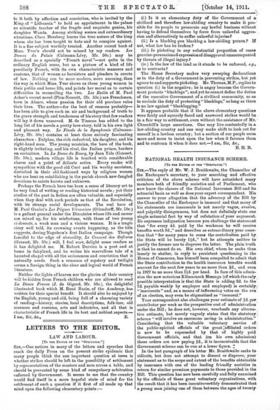LETTERS TO THE EDITOR.
LAW AND LABOUR.
ITO THE EDITOR Or TEE "SPECTATOR."]
SIA,— One notices in many of the letters and speeches that reach the daily Press on the present strike epidemic that many people think the one important question at issue is whether strikes should be left to the possibility of settlement by representatives of the masters and men across a table, and should be prevented by some kind of compulsory arbitration enforced by Government. It seems to me that the country would find itself in a more hopeful state of mind for the settlement of such a question if it first of all made tip that mind upon the following elementary points
(i.) Is it an elementary duty of the Government of a civilized and therefore law-abiding country to make it pos- sible for its people to prosecute any lawful business without having to defend themselves by force from unlawful aggres- sion and alternatively to suffer unlawful injuries ?
(ii.) Is a blackleg qua blackleg a law-abiding person ? If not, what law has be broken ?
(iii.) Is picketing in any substantial proportion of cases genu ine-persuasioned expression of disapproval unaccompanied by threats of illegal injury ?
(iv.) Is the law of the land as it stands to be enforced, e.g., as to contracts ?
The Home Secretary makes very sweeping declarations as to the duty of a Government in preventing strikes, but yet agrees to and supports picketing. Mr. Thomas, M.P., replies to question (i.) in the negative; be is angry because the Govern- ment protects "blacklegs"; and yet he cannot define the duties of the executive Government of a civilized community, so as to exclude the duty of protecting" blacklegs," so long as there is no law against " blacklegging."
It appears probable that if the above elementary questions were fairly and squarely faced and answered strikes would be in a fair way to settlement, even without the assistance of Mr. ' Churchill's large assertions. One may live contentedly in a law-abiding country and one may make shift to look out for oneself in a lawless country; but a section of our people seem more and more to insist upon the law when it favours them and to contemn it when it does not. —I am, Sir, &e., E. H. B.


















































 Previous page
Previous page